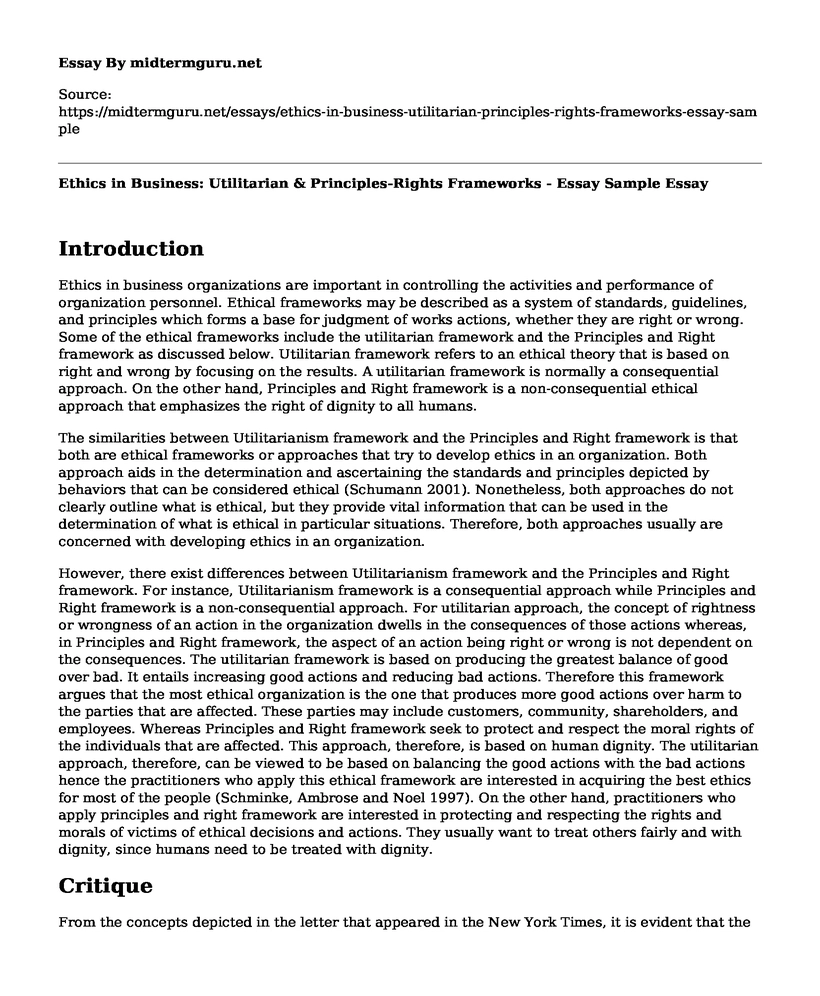Introduction
Ethics in business organizations are important in controlling the activities and performance of organization personnel. Ethical frameworks may be described as a system of standards, guidelines, and principles which forms a base for judgment of works actions, whether they are right or wrong. Some of the ethical frameworks include the utilitarian framework and the Principles and Right framework as discussed below. Utilitarian framework refers to an ethical theory that is based on right and wrong by focusing on the results. A utilitarian framework is normally a consequential approach. On the other hand, Principles and Right framework is a non-consequential ethical approach that emphasizes the right of dignity to all humans.
The similarities between Utilitarianism framework and the Principles and Right framework is that both are ethical frameworks or approaches that try to develop ethics in an organization. Both approach aids in the determination and ascertaining the standards and principles depicted by behaviors that can be considered ethical (Schumann 2001). Nonetheless, both approaches do not clearly outline what is ethical, but they provide vital information that can be used in the determination of what is ethical in particular situations. Therefore, both approaches usually are concerned with developing ethics in an organization.
However, there exist differences between Utilitarianism framework and the Principles and Right framework. For instance, Utilitarianism framework is a consequential approach while Principles and Right framework is a non-consequential approach. For utilitarian approach, the concept of rightness or wrongness of an action in the organization dwells in the consequences of those actions whereas, in Principles and Right framework, the aspect of an action being right or wrong is not dependent on the consequences. The utilitarian framework is based on producing the greatest balance of good over bad. It entails increasing good actions and reducing bad actions. Therefore this framework argues that the most ethical organization is the one that produces more good actions over harm to the parties that are affected. These parties may include customers, community, shareholders, and employees. Whereas Principles and Right framework seek to protect and respect the moral rights of the individuals that are affected. This approach, therefore, is based on human dignity. The utilitarian approach, therefore, can be viewed to be based on balancing the good actions with the bad actions hence the practitioners who apply this ethical framework are interested in acquiring the best ethics for most of the people (Schminke, Ambrose and Noel 1997). On the other hand, practitioners who apply principles and right framework are interested in protecting and respecting the rights and morals of victims of ethical decisions and actions. They usually want to treat others fairly and with dignity, since humans need to be treated with dignity.
Critique
From the concepts depicted in the letter that appeared in the New York Times, it is evident that the corporation applies utilitarian framework as it subjects managers into pressure such that they are forced to set aside their personal values and favor the corporate interests. The corporates, therefore, need to obey the economic model of corporate social responsibility in such a way that society will benefit the success of the corporations. Therefore, the corporations should freely produce and market their products that are needed by society in order for society to benefit (Aram J. 2018). More so, the corporate should consider stakeholder theory and observe ethics in the process of addressing morals and values in the management of corporations. It is important to manage corporations without the subordination of pressurizing leadership effectively.
Conclusion
In conclusion, it is important to apply favorable and effective ethical frameworks in any organization, that are genuine and less pressurizing since every individual requires dignified treatment, whereby their rights are respected and well protected. Furthermore, management of organizations should ensure that the organizations operate to serve the community needs.
References
Aram J. (2018). Personal Values vs. Corporate Interest. https://www.nytimes.com/2018/12/20/opinion/letters/mckinsey-personal-values-corporate-interests.html
Schminke, M., Ambrose, M. L., & Noel, T. W. (1997). The effect of ethical frameworks on perceptions of organizational justice. Academy of Management Journal, 40(5), 1190-1207.
Schumann, P. L. (2001). A moral principles framework for human resource management ethics. Human Resource Management Review, 11(1-2), 93-111.
Cite this page
Ethics in Business: Utilitarian & Principles-Rights Frameworks - Essay Sample. (2023, Jan 01). Retrieved from https://midtermguru.com/essays/ethics-in-business-utilitarian-principles-rights-frameworks-essay-sample
If you are the original author of this essay and no longer wish to have it published on the midtermguru.com website, please click below to request its removal:
- Volkswagens Issue a Convertible Bond - Paper Example
- Management Essay Sample: Shell Company Analysis
- Letter for Alkermes Inspiration Grant: Free Drug Community
- Article Analysis Essay on Factors Affecting Business Success of Small and Medium Enterprises
- Research Paper on Local Organizations Currently Working Towards Social Change in Toronto
- Pets at Home Plc Cash Flows: Increase Between 2014-2018 - Essay Sample
- Cirque du Soleil: Innovate to Grow With New Blue Ocean Strategy - Essay Sample







